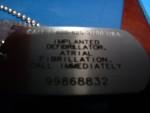World Heart Day 2005

David in the summer of 1988,
hand over heart! Very cute!
Do you know the difference between cardiac arrest (heart attack) and sudden cardiac death? They both sound pretty ominous! Well here is an explanation that a cardiologist offered to me: think of cardiac arrest as a problem with the plumbing. There is a clog or obstruction somewhere which is severely affecting the flow of blood to the heart. There can be varying levels of the problem. A person having a heart attack may experience several symptoms such as arm or jaw pain, nausea, stomach upset, chest pains. Heart attacks can cause minor damage to the heart muscle - or they can be fatal. It is imperative that a person in cardiac arrest receive medical intervention immediately. Long term treatment may involve heart bypass surgery, lifestyle changes, and medications such as blood thinners, beta blockers, and such.
In contrast, "sudden cardiac death" can be described as an electrical problem. There is a power failure, as though somebody just switches the power off. Period. There are no painful symptoms. Your heart stops beating properly, and within seconds, you lose consciousness. There is no treatment for Sudden Cardiac Death brought on by Brugada Syndrome. This is why patients are fitted with an implantable defibrillator.We aren't sure exactly how common Brugada Syndrome exists in the population,
one 2002 Italian study found "The current prevalence estimate is 1-5/10.000 in the Western countries. Higher frequency (1/2500) may be found in eastern countries, especially Thailand, where BrS is considered the major cause of sudden death in young individuals."
So in our small town, perhaps 5 to 10 people are walking around with Brugada Syndrome. And that is only one of several serious, diagnosable conditions that may lead to sudden cardiac death. There are others, such as Marfan Syndrome, or Long QT Syndrome. Should people be screened for these conditions, so that they may receive treatment?In the United Kingdom, there is an active movement to raise awareness of sudden death syndrome and generally, cardiac risk of the young. One organization,
C-R-Y, is working with the medical community to establish a national screening program. It recommends that youngsters receive a few screening electrocardiographs over the course of several years, with special attention to young athletes, a group at special risk for some cardiac conditions.
Electrocardiographs are noninvasive, quick and easy screening methods. But they aren't free. Is it worth the time and money to screen millions of people for such a rare condition?
The next time you read a sad story about a young healthy person who dies in her sleep, think about it: a routine screening electrocardiograph, conducted years earlier, just might have saved her life...
 Here is a lovely tee shirt that belongs to Dave.
Here is a lovely tee shirt that belongs to Dave.


